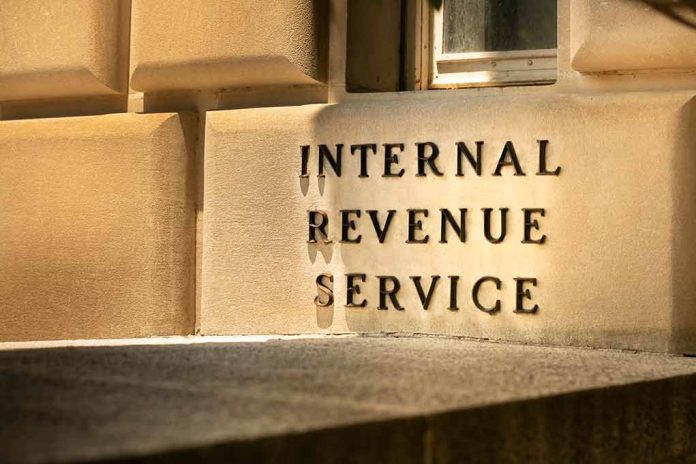
DHS Secretary Kristi Noem’s request to deputize IRS agents for immigration enforcement sparks controversy and legal challenges.
Key Takeaways
- DHS Secretary Kristi Noem has asked Treasury to deputize IRS agents for immigration enforcement tasks.
- The initiative aims to enhance investigative resources for illegal employment and human trafficking.
- President Trump proposes moving nearly 90,000 IRS agents to assist in securing the southern border.
- Sanctuary cities, led by San Francisco, are legally challenging Trump’s executive orders on immigration enforcement.
- Critics argue this move could divert resources from the IRS’s primary tax enforcement duties.
DHS Seeks IRS Assistance in Immigration Enforcement
In a bold move to bolster immigration enforcement, Department of Homeland Security (DHS) Secretary Kristi Noem has requested the Treasury Department to deputize Internal Revenue Service (IRS) agents for immigration-related tasks. This initiative, aimed at tackling illegal immigration, has ignited a fierce debate across the nation.
The proposal seeks to leverage the IRS’s resources, particularly its 2,100 trained law enforcement officers, to assist in various aspects of immigration enforcement. These tasks include auditing employers suspected of hiring unauthorized migrants, investigating human trafficking, and participating in immigration task forces.
Instead of having Biden’s 87,000 IRS agents take more money from Americans, I have requested that they help taxpayers SAVE money by helping ICE round up criminal illegal aliens for deportation. pic.twitter.com/hD4v3xDNWf
— Kristi Noem (@KristiNoem) February 10, 2025
Trump Administration’s Immigration Enforcement Strategy
Secretary Noem’s request aligns with President Donald Trump’s broader immigration policies. The administration has taken a hardline stance on illegal immigration, with Trump proposing to move nearly 90,000 IRS agents to assist in securing the southern border. This move is part of a larger strategy to use all available resources to enforce immigration laws.
The DHS has already partnered with various law enforcement agencies, including the Department of Justice, Texas National Guard, and Texas Attorney General’s Office. The addition of IRS agents is seen as a way to strengthen the government’s ability to build complex cases involving tax, immigration, and money laundering charges.
Concerns and Criticisms
While the administration touts the benefits of this initiative, critics argue that it could have significant drawbacks. One major concern is the potential diversion of resources from the IRS’s primary tax enforcement duties. This shift could lead to increased tax evasion and potentially widen the U.S. deficit.
Moreover, sanctuary cities, spearheaded by San Francisco, are mounting legal challenges against Trump’s executive orders. These orders aim to cut federal funding to sanctuary cities and prosecute non-cooperative local officials. San Francisco City Attorney David Chiu argues that sanctuary laws actually improve public safety and that the federal government is overstepping its authority.
Potential Impact and Future Developments
If implemented, this initiative could significantly alter the landscape of immigration enforcement in the United States. The deputized IRS agents could be involved in a large-scale, multi-agency operation in Los Angeles, targeting various aspects of illegal immigration.
As the debate continues and legal challenges unfold, the outcome of this controversial initiative remains uncertain. What is clear, however, is that it has sparked a nationwide conversation about the role of federal agencies in immigration enforcement and the balance between national security and civil liberties.
Sources:
I.R.S. Agents Are Asked to Help With Immigration Crackdown
Trump’s Department of Homeland Security looking to deputize IRS agents for immigration enforcement
Homeland Security asks for IRS agents to be deputized to root out illegal migrants













